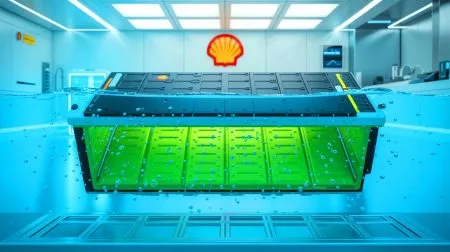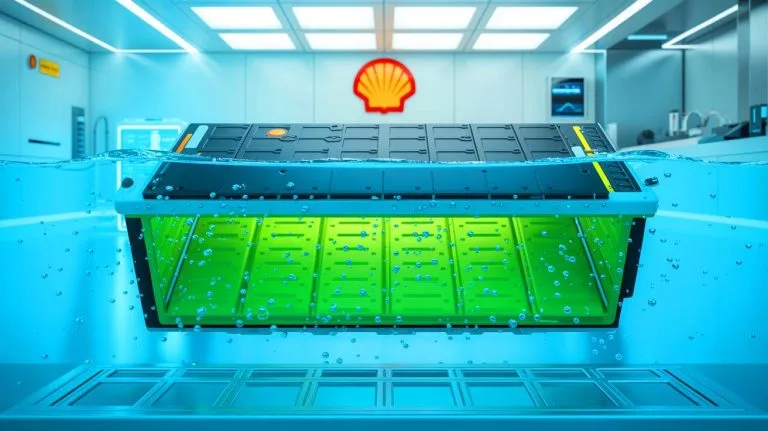| IN A NUTSHELL |
|
As the global market for battery electric vehicles (BEVs) continues its rapid expansion, the need for improved battery technology becomes more urgent. A recent breakthrough by Shell Lubricants could potentially reshape how electric vehicles are charged. Shell has developed the EV-Plus Thermal Fluid, a high-performance thermal management solution that promises to charge EV batteries from 10% to 80% in less than ten minutes. This innovation addresses one of the most significant barriers to widespread EV adoption: the time it takes to charge these vehicles. In collaboration with RML Group, Shell demonstrated the fluid’s capabilities with a 34 kWh battery pack, showcasing the potential to add up to 14 miles of range per minute of charging.
Enhancing Heat Management
Managing heat is a critical challenge in electric vehicle battery technology. High-speed charging generates significant thermal energy, which can lead to accelerated cell degradation, reduced battery lifespan, and, in rare instances, safety issues like thermal runaway. Traditional cooling systems often use cold plates that provide only indirect contact with battery cells, leading to uneven temperature distribution. Shell’s approach offers a promising solution through its EV-Plus Thermal Fluid used in an immersion cooling system.
This method involves submerging battery cells directly in a non-conductive liquid, ensuring uniform contact for efficient heat transfer. The fluid fills all spaces between cells, allowing for consistent temperature control across the entire battery pack. This is particularly advantageous under the high-stress conditions of ultra-fast charging. Formulated with Shell’s proprietary Gas-to-Liquid (GTL) Technology, this approach not only enhances battery thermal performance but also contributes to higher charging efficiencies, improved safety, and cost-effectiveness. As Jason Wong, Global Executive Vice President of Shell Lubricants, stated, this innovation supports the widespread adoption of BEVs demanded by global legislative initiatives.
Reducing Time Spent at Charging Stations
As BEV sales surged by 14% in 2024, the demand for technologies that make EVs more practical for consumers has grown exponentially. Shell’s thermal management fluid aims to reduce the time spent at charging stations, making the EV ownership experience more akin to refueling a conventional vehicle. Robert Mainwaring, Shell’s lead engineer on the project, emphasized the ambition to demonstrate how the EV-Plus Thermal Fluids significantly cut charging times without compromising cell integrity and lifespan.
Drawing from Shell’s expertise in related fields, such as transformer oils and cooling fluids for data centers, the company suggests that effective immersion cooling could enable simpler, more compact battery pack designs. This could potentially reduce complexity and costs, further enhancing the appeal of electric vehicles to a broader audience. By reducing charging times, Shell aims to make electric vehicles a more attractive option for consumers who have been hesitant to make the switch from traditional gasoline-powered cars.
Addressing Consumer Concerns
Consumer concerns about charging duration have long been identified as a major barrier to EV adoption. In fact, over 44% of non-EV drivers in major automotive markets cite this issue as a key reason for their reluctance. Shell’s new thermal fluid addresses this concern head-on by enabling faster charging without sacrificing battery health. By improving the efficiency and effectiveness of battery cooling, Shell’s solution could remove one of the last remaining hurdles to mainstream EV adoption.
Moreover, the potential for smaller, lighter batteries capable of adding significantly more range than typical BEVs could revolutionize the industry. The current market leader in efficiency, the Lucid Air Pure, operates at approximately 5 miles per kWh. Shell’s test project demonstrates the potential to significantly exceed this benchmark. As the technology matures and becomes more widely adopted, it could pave the way for a new generation of electric vehicles that appeal to a far broader consumer base.
How supercars are changing the face of automotive technology
Implications for the Future of Electric Vehicles
Shell’s innovation in thermal management fluid technology holds significant implications for the future of electric vehicles. By making EVs more practical and convenient, this breakthrough could accelerate the shift away from fossil fuels toward cleaner, more sustainable transportation options. The ability to charge a vehicle in minutes rather than hours addresses a critical consumer pain point and could encourage wider adoption of electric vehicles across diverse demographic groups.
As global legislative initiatives continue to push for reduced emissions and increased sustainability, technologies like Shell’s EV-Plus Thermal Fluid will play a crucial role in meeting these goals. The potential for reduced charging times, improved battery efficiency, and cost-effective designs could transform the electric vehicle landscape. As we look to the future, the question remains: how will other industries and technologies adapt to complement these advancements, and what further innovations can we expect in the pursuit of sustainable transportation?
Did you like it? 4.4/5 (27)







Wow, charging in under 10 minutes? That’s faster than my morning coffee! ☕️
This sounds too good to be true! How does this fluid work so fast? 🤔